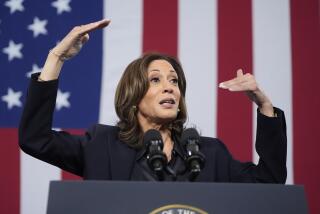In Midwest Talk, Dukakis’ Rhetoric Has a New Ring
- Share via
CHICAGO — Michael S. Dukakis took his front-running presidential campaign to the industrial Midwest on Wednesday with strong shots at his competition and a sudden emphasis on populist rhetoric.
Dukakis called his showing on Super Tuesday, when he won eight states and 387 delegates, more than any of his rivals, a “terrific victory.”
“Here I am, a governor from Massachusetts, leading the pack for the Democratic nomination,” Dukakis told two dozen unemployed steelworkers over coffee and danish at the Lion’s Den restaurant in an ethnic section of Chicago.
Dukakis’ aides said their only surprise Tuesday was that Tennessee Sen. Albert Gore Jr. won six states and had emerged from the South as the party’s third-place challenger behind the Rev. Jesse Jackson. “He wasn’t on our radar,” one said.
Caught Off Guard
While the Dukakis camp considers Gore far less threatening than Missouri Rep. Richard A. Gephardt in the Northern industrial states, aides had hoped the two would split more states to keep them both weak and wounded. Gephardt won only in his home state of Missouri.
If it was caught off guard, the Dukakis campaign lost no time in training its post-Gephardt guns on Gore.
“I’m not sure he’s a major contender,” Dukakis told reporters after a tour of the Metron Steel refabrication plant in South Chicago. He said he and Gore have “fundamental differences” on such issues as Gore’s support for the Midgetman missile.
Paul Brountas, Dukakis’ national campaign chairman, dismissed Gore as a “regional candidate” with little national support.
Lion’s Share of Vote
“Don’t forget Gore said a few weeks ago that he had to come out of the South with the lion’s share of the vote,” Brountas said. “Well, we got the lion’s share of the vote and the lion-sized states.”
“Look how Gore has shifted,” Brountas added. “Three weeks ago, he only talked about foreign policy and defense. One week ago, he began sounding like Dick Gephardt. Last night he started talking about the workingman. That’s a new phenomenon.”
Dukakis and his aides also suggested that Illinois voters should ignore favorite son Sen. Paul Simon’s last-ditch effort to keep his campaign alive, as well as Chicago-based Jackson’s hometown appeal.
With three liberals in the race, Brountas said, “Liberals are going to have to look at who is the most electable. That’s the issue.”
‘Not Very Liberal’
The campaign argues that Dukakis is the most moderate of the three. “Compared to Simon and Jackson, Mike Dukakis is not very liberal,” said Mike Bakalis, state campaign chairman. “He’s more to the center.”
With that in mind, Dukakis began using language here with an unfamiliar ring, especially considering his frequent denunciations of Gephardt’s Korea-bashing and retaliatory trade proposals.
“If Korea will not permit its citizens to organize and bargain collectively, and they haven’t, then we should not be giving that country trade preference,” Dukakis told the unemployed steelworkers.
He also used strong language to attack corporate raiders, giant corporate mergers and acquisitions, and “monopoly games” on Wall Street.
“Has anybody heard from the antitrust division of the Justice Department?” he asked. “Do they exist? Has anybody heard from the Federal Trade Commission?”
Not Anti-Establishment
Campaign spokesman Mark Gearan denied that Dukakis was taking a new anti-Establishment approach. He said the candidate had used similar language in a speech last May at Bentley College in Waltham, Mass.
More to Read
Sign up for Essential California
The most important California stories and recommendations in your inbox every morning.
You may occasionally receive promotional content from the Los Angeles Times.


![1988: The image of George H.W. Bush towering over his Democratic opponent, Massachusetts Gov. Michael Dukakis, might be the second-most notable contrast in debate history (after the first Nixon-Kennedy debate). What you might remember: At the start of the second meeting held at UCLAs Pauley Pavilion -- CNN newsman Bernard Shaw asked Dukakis, an opponent of the death penalty, one of the more shocking questions in debate history: Governor, if [your wife] Kitty Dukakis were raped and murdered, would you favor an irrevocable death penalty for the killer? Dukakis bland response sealed his fate in the general election. What you might have forgotten: Just about everything else in the two debates.](https://ca-times.brightspotcdn.com/dims4/default/039226c/2147483647/strip/true/crop/586x392+0+17/resize/320x214!/quality/75/?url=https%3A%2F%2Fcalifornia-times-brightspot.s3.amazonaws.com%2F79%2F73%2F27f118f5a47485c01012372b100f%2Fla-pres-debate1988-i5paygkf)








